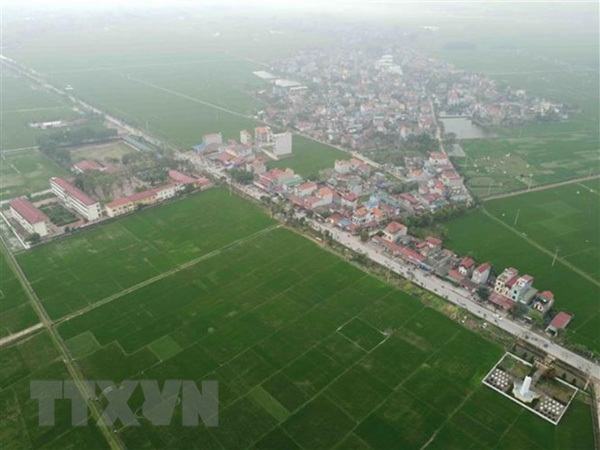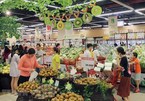 |
|
An aerial view of rice fields in Hoa Son Commune of Hanoi's Ung Hoa District.
|
The amount is 15% higher than total investment to the programme in the 2016-2020 period.
Apart from the amount, the city will allocate additional VND400 billion to the Hanoi branch of the Vietnam Bank for Social Policies each year to offer soft loans to production and business establishments, farms and labourers in the agricultural sector.
To this end, the municipal People’s Committee has set five major tasks and solutions, including the strengthening of communications to improve public awareness of agriculture, farmers and rural areas among officials, Party members and the community.
The city will work to enhance the Party leadership over agriculture and rural development, while improving the capacity of State management officials, and innovating the management methods and speeding up administrative reform. The city will promote the role of the Vietnam Fatherland Front Committee as well as socio-political organisations and trade associations as well as the responsibility of leaders of agencies in the work.
At the same time, Hanoi will review and adjust its planning and projects on new-style rural areas, while continuing to developing the socio-economic infrastructure to suit its urban development.
Meanwhile, it will organise training courses for officials involving in advanced and model new-style rural building. The organisation of the coordinating offices for new-style rural area building will be completed from the city to grassroots levels.
Apart from its efforts to restructure the agricultural sector, the city will focus on implementing the Government’s Decree No. 98/2018/ND-CP dated on July 5, 2018 on encouraging cooperation and connectivity in agricultural production and farm produce selling, while developing concentrated production regions and strong products of each locality to draw more investments from businesses.
Along with promoting sustainable agricultural development and improving the quality, value and competitiveness of local farm produce, Hanoi will pay greater attention to environmental protection and increasing incomes for locals in rural areas.
In 2025, the capital city aims to complete all targets in new-style rural area building programme in all districts and communes. In the year, it expects 20% of total districts recognised as advanced new-style rural areas, 40% of its total communes completing all criteria of an advanced new-style rural area, and 20% of the communes becoming model new-style rural areas.
According to the municipal Department of Agriculture and Rural Department, so far, Hanoi has had 12 out of its total 18 districts and townships recognised as new-style rural areas, while 368 out of 382 communes, or 96.3%, have received the title.
The department reported that 29 communes of the capital city have fulfilled all criteria of advanced new-style rural areas, including 100% of communes in Dan Phuong district.
The remaining six districts are expected to complete all criteria in 2021 and 2022. The 14 communes that have yet to be recognised as new-style rural areas are under verification process.
Director of the department Chu Phu My said that in the third quarter of 2021, the COVID-19 pandemic has posed many difficulties to the implementation of the new-style rural area building programme.
In that context, Hanoi has issued many drastic, timely and flexible directions to control COVID-19, maintain the supply chain and recover production at the same time. The local Coordination Office for new-style rural area building programme has organised five training courses on online selling for nearly 500 farmers, while launching a pilot model to promote OCOP products and regional specialties via videoconference, said My.
He said that in the remaining of the year, the city will mobilise resources to keep up the progress of the new-style rural area building, while applying measures to prevent the pandemic and boost production recovery at the same time. Other tasks for the period from now to the end of the year is to prepare sufficient supply of foodstuff for the market, especially during the Lunar New Year festival (Tet holiday), and strive to raise per capita income of farmers to VND60 million (US$2,635) per year.
Source: VNA

Vietnam develops modern supply system for farm produce
Vietnam needs to develop a system of modern agricultural product supply centres which can help to promote the consumption of farm produce in value chains, enhance food safety and hygiene, and improve the competitive edge of Vietnamese goods.

Hanoi to invest $11.4 million on OCOP programme
Hanoi has announced it will spend VND265 billion (US$11.4 million) to implement the One Commune-One Product (OCOP) programme to boost the agricultural economy and rural development.